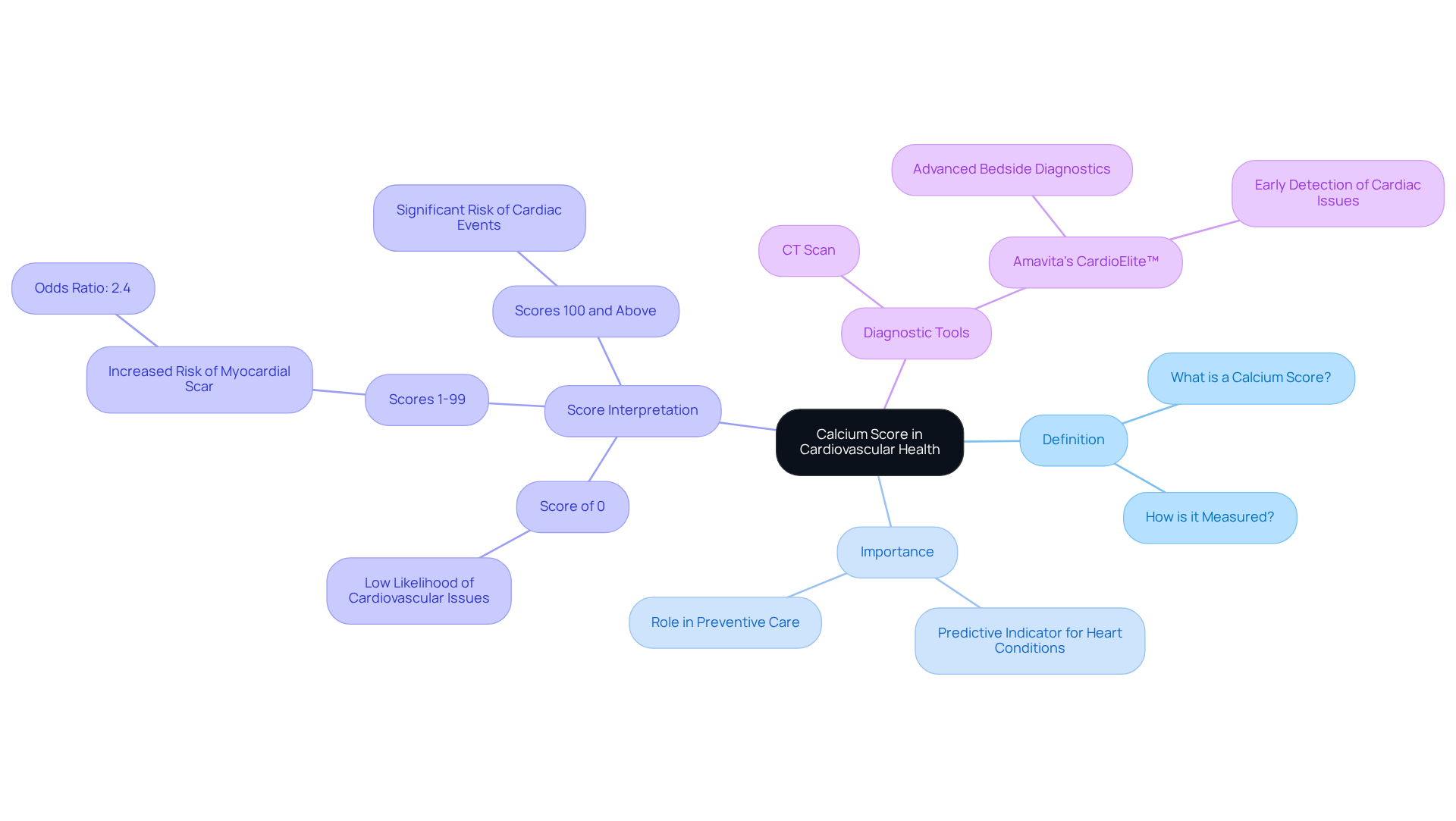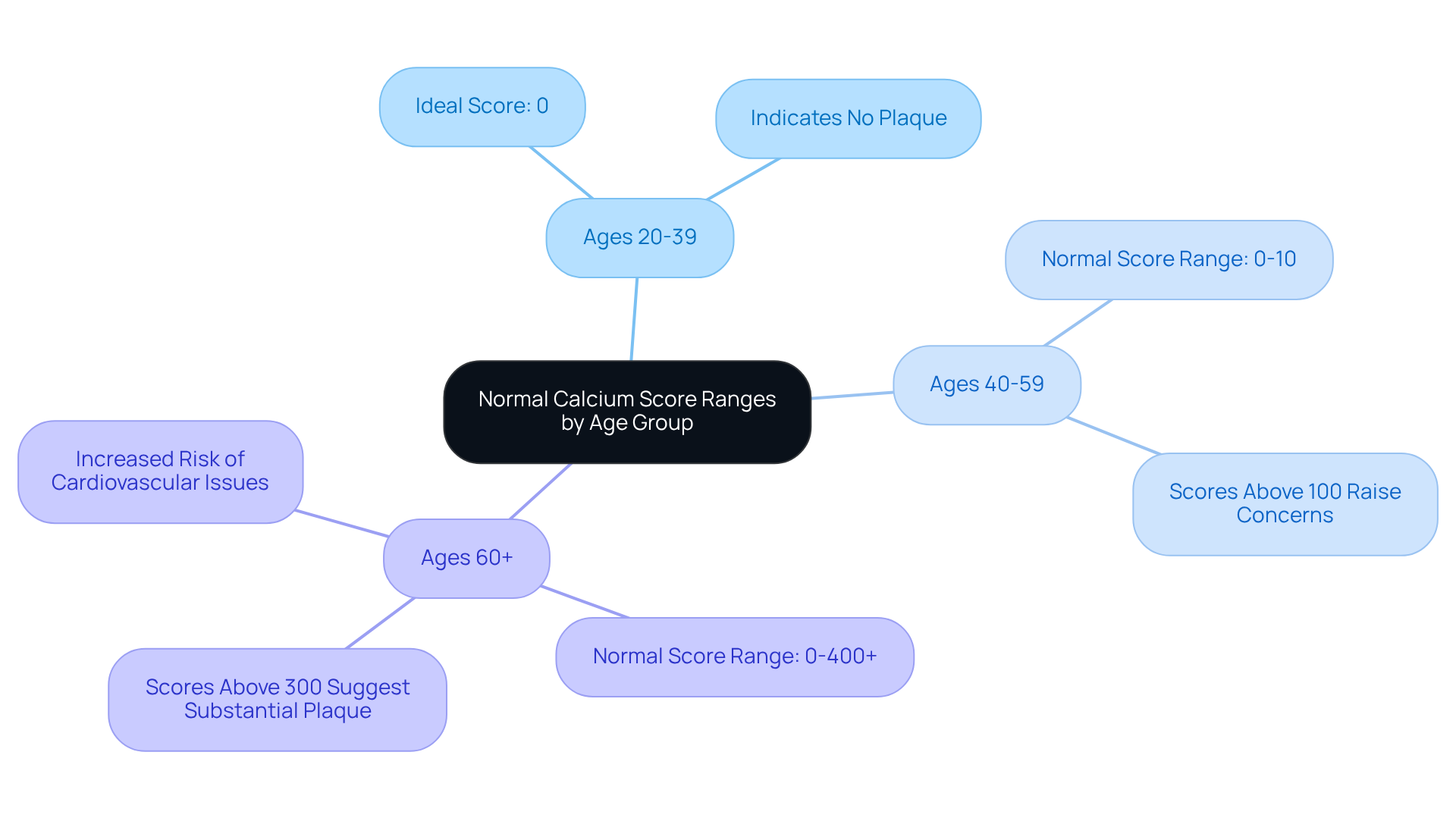


Understanding normal calcium scores by age is crucial for assessing heart health, especially as we grow older. These scores, derived from CT scans, reveal the presence of calcified plaque in our coronary arteries, which can be a source of concern. A calcium score of 0 suggests a low cardiovascular risk, offering some reassurance. However, higher scores indicate an increased risk of heart disease, highlighting the importance of regular monitoring and proactive management. This is particularly vital for older adults and those with risk factors, as staying informed can lead to better health outcomes.
In addition to this, it’s essential to recognize that each individual's health journey is unique. Regular check-ups and open conversations with healthcare providers can help address any worries you may have. Remember, you are not alone in this; there is support available to guide you through your heart health journey. By staying proactive and informed, you can take significant steps towards maintaining your well-being.
Understanding the nuances of heart health is more critical than ever, especially as we navigate the complexities of cardiovascular risks that come with aging. Many may feel anxious about their heart health, and that’s completely understandable. The calcium score, a simple yet powerful indicator derived from a CT scan, offers valuable insights into the presence of calcified plaque in our coronary arteries. This score serves as a predictive tool for potential heart issues, providing a clearer picture of our cardiovascular health.
However, it’s important to recognize that what constitutes a 'normal' calcium score can vary significantly by age. This variability raises essential questions about how we can interpret our scores and what they mean for our overall health. How can we leverage this knowledge to make informed decisions? By understanding our calcium scores, we can take proactive steps toward better heart health, ensuring we feel empowered in our journey.
In addition to this, seeking guidance from healthcare professionals can provide reassurance and clarity. Remember, you are not alone in this; support is available to help you navigate your heart health concerns. Together, we can work toward a healthier future.
Understanding your heart health is crucial, and a measurement of your normal calcium score by age is a key tool in this journey. Typically acquired through a CT scan, this measurement assesses the amount of calcified plaque in your coronary arteries. It serves as an essential predictive indicator for coronary artery conditions and potential cardiac events. If your calcium score is 0, it suggests no identifiable calcified plaque, indicating a low likelihood of cardiovascular issues. However, higher values indicate increasing plaque levels, which are associated with a greater risk of cardiovascular incidents.
For instance, research shows that compared to a calcium measurement of 0, scores between 1 and 99 significantly increase the chances of myocardial scar formation, with an odds ratio of 2.4. This emphasizes the importance of monitoring your calcium levels to maintain a normal calcium score by age, especially for older adults who are at a higher risk of heart disease. By understanding your calcium level, you can take proactive steps toward preventive care and treatment options, making it a vital resource in managing your cardiovascular health.
With Amavita's CardioElite™, patients can benefit from advanced bedside diagnostics that enable early detection of cardiac issues. This allows for timely interventions that can greatly improve health outcomes. The CardioElite™ system also helps reduce emergency transfers and enhances overall patient care and operational efficiency. Furthermore, recent research reinforces the predictive value of calcium measurements, highlighting their role in guiding clinical decisions and improving patient care through seamless coordination and advanced diagnostic capabilities.
Taking care of your heart is a journey, and understanding these measurements can empower you to make informed choices about your health. Reach out to your healthcare provider to learn more about how you can monitor and manage your cardiovascular health effectively.

Calcium ranges can vary significantly by age, making it crucial to understand the normal calcium score by age for individuals who may be at higher risk. For those aged 20-39, an ideal result is 0, which indicates no plaque. As we transition into the 40-59 age range, results may begin to indicate mild plaque, with a normal calcium score by age being 0-10. For individuals aged 60 and older, the normal calcium score by age can range from 0 to over 400, with elevated values suggesting a heightened risk. Consider the following:
Understanding these ranges can be particularly beneficial for high-risk patients, including those with diabetes, hypertension, or a family history of heart disease. This knowledge empowers individuals and healthcare providers to make informed decisions regarding cardiovascular health. It is especially important when considering advanced imaging and comprehensive evaluations available at Amavita Heart and Vascular Health. Remember, you are not alone in this journey; support is available to help you navigate your health concerns.

Several factors can influence the normal calcium score by age, which is crucial for understanding your heart health.
Age: As we age, the likelihood of developing calcified plaque can affect our normal calcium score by age. This makes proactive management essential. Amavita's CardioElite™ program integrates AI and AHA certification, offering advanced, real-time diagnostic data to help you monitor these changes effectively.
Gender: Did you know that men generally possess higher calcium levels than women at comparable ages? This emphasizes the necessity for customized assessments in cardiovascular care tailored to your needs.
Family History: If there is a family history of heart disease, you may be predisposed to higher calcium levels. This underscores the importance of comprehensive assessments for high-risk patients, such as those enrolled in the CardioElite™ program, who deserve special attention.
Lifestyle Factors: Your lifestyle choices matter. Smoking, poor diet, lack of exercise, and obesity can lead to elevated calcium levels. Conversely, a healthy lifestyle can help maintain lower levels. Amavita emphasizes lifestyle modifications as part of its holistic approach to cardiac health, supporting you every step of the way.
Chronic Conditions: Conditions like diabetes, hypertension, and high cholesterol can also increase calcium levels. The CardioElite™ program is designed to address these chronic conditions through advanced imaging and personalized treatment plans, ensuring you receive the care you need.
Understanding these elements can help you evaluate your vulnerability and take preventative actions to enhance your cardiovascular well-being. Remember, you are not alone; the extensive care provided by Amavita is here to support you.

Understanding your calcium results is vital for addressing cardiovascular concerns, particularly by considering the normal calcium score by age, especially for those at high risk. Let’s explore what different score ranges mean for your health:
Score of 0: This score signifies no calcified plaque, indicating a low risk of heart disease. It's important to maintain a healthy lifestyle and have regular check-ups. Research shows that individuals who have a normal calcium score by age of 0 experience a very low rate of cardiovascular incidents, with a 10-year event rate of just 0.47%.
Scores 1-10: These scores suggest minimal plaque presence. Simple lifestyle changes, such as improving your diet and increasing physical activity, may be enough to manage your cardiovascular health effectively.
Scores 11-100: This range indicates a mild cardiac condition. It’s advisable to seek further assessment, and healthcare professionals might recommend lifestyle modifications or medication to mitigate risks. Patients in this category often benefit from enhanced LDL cholesterol reduction strategies to maintain a normal calcium score by age.
Scores 101-400: Scores in this range point to moderate cardiovascular issues. A comprehensive cardiovascular evaluation is recommended, and treatment options—including medication and lifestyle changes—should be discussed with your healthcare provider. Studies indicate that individuals with a normal calcium score by age of 100 or more have a significantly higher likelihood of serious coronary heart disease events.
Scores above 400: Such scores indicate significant plaque buildup, often requiring immediate medical attention. Patients with these ratings face a markedly increased risk of cardiovascular events, with research showing a 9.7-fold greater risk of all-cause mortality compared to those who have a normal calcium score by age of 0.
After receiving your calcium score, it’s essential to consult with a healthcare provider. This conversation will help you understand your results and develop a personalized plan that may include lifestyle changes, medication, or further testing to ensure your heart health is optimized. Remember, you are not alone in this journey; support is available to help you take the necessary steps towards better health.

Understanding the normal calcium score by age is vital for maintaining heart health and preventing cardiovascular disease. This measurement, which assesses calcified plaque in the coronary arteries, serves as a crucial indicator of potential heart-related issues. By recognizing the implications of calcium scores, you can take proactive steps toward better health, especially as you age and face increased risks.
It's important to know the normal calcium score ranges for different age groups. Scores can vary significantly with age. For younger individuals, a score of 0 is ideal, while older adults may experience higher scores that indicate increased plaque buildup and cardiovascular risk. Additionally, factors such as age, gender, family history, lifestyle choices, and chronic conditions all influence these scores. This underscores the need for personalized assessments and interventions tailored to your unique situation.
Staying informed about calcium scores and their implications empowers you to make informed health decisions. Regular monitoring, lifestyle modifications, and consultations with healthcare providers are crucial steps in effectively managing cardiovascular health. Embracing this knowledge and taking action can lead to healthier outcomes and a more informed approach to your heart health. Remember, you are not alone in this journey; support is available, and taking these steps can make a meaningful difference in your well-being.
What is a calcium score and how is it measured?
A calcium score is a measurement of the amount of calcified plaque in the coronary arteries, typically acquired through a CT scan.
Why is the calcium score important for cardiovascular health?
The calcium score serves as a predictive indicator for coronary artery conditions and potential cardiac events, helping to assess the risk of cardiovascular issues.
What does a calcium score of 0 indicate?
A calcium score of 0 suggests no identifiable calcified plaque, indicating a low likelihood of cardiovascular problems.
How do higher calcium scores relate to cardiovascular risk?
Higher calcium scores indicate increasing levels of plaque, which are associated with a greater risk of cardiovascular incidents.
What is the significance of scores between 1 and 99?
Scores between 1 and 99 significantly increase the chances of myocardial scar formation, with an odds ratio of 2.4 compared to a score of 0.
Who should particularly monitor their calcium scores?
Older adults, who are at a higher risk of heart disease, should monitor their calcium scores to maintain cardiovascular health.
How can patients benefit from Amavita's CardioElite™?
Amavita's CardioElite™ provides advanced bedside diagnostics for early detection of cardiac issues, allowing for timely interventions that can improve health outcomes.
What recent research highlights the role of calcium measurements?
Recent research reinforces the predictive value of calcium measurements, emphasizing their role in guiding clinical decisions and improving patient care through advanced diagnostic capabilities.
How can individuals take proactive steps toward managing their cardiovascular health?
Individuals can monitor their calcium levels and consult with healthcare providers to learn more about preventive care and treatment options for cardiovascular health.